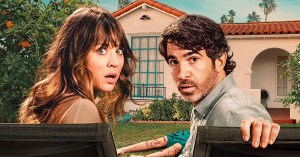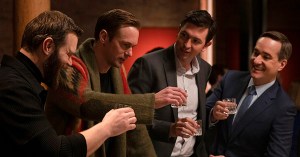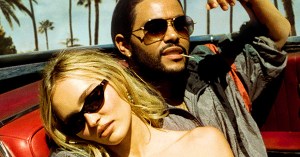Why The Boys’ Twisted Take on the Superhero Genre Is So Deeply Satisfying
The Amazon series, about diabolical superheroes and hardscrabble vigilantes, flips the genre on its head – then farts in its face.
Although superhero shows make up the bulk of Comics on TV options, the format can get a little tiresome at times. Whether it be repeated plot points or uninspired antagonists – we’re looking at you, Ricardo Diaz – the grind of a superhero show can lead to a certain amount of fatigue. This goes double for a casual viewer less interested in the crossover potential of the Arrowverse or the late, lamented Marvel universe on Netflix.
But the first half of 2019 has seen a number of startling and well-produced superhero shows redefine and revitalize what the genre can be. Instead of season-long big bads strung across 22-episodes, the heroes face existential crisis in shorter seasons. And in at least one case, Amazon’s adaptation of The Boys, the supers are anything but heroes. In fact, the series, and its unique take on super-powered people, has revitalized the superhero show as a whole in just 8 episodes thanks to its adventurous storytelling.
So let’s take a look at some of the ways it uses capes, heat vision, PTSD, and old-fashion love stories to give the superhero genre a fresh perspective.
Spoiler Alert: The following discusses plot points from the entire first season of Amazon series The Boys. Stop now if you haven’t watched every episode.
It Adapts Finite Source Material
One of the key things setting The Boys – and some of the other 2019 debuts, in fact – apart from an Arrowverse or a Marvel show is its source material, the 72-issues series (and some special releases) by Garth Ennis and Darick Robertson. The finite nature of the original comic book makes it more like a novel than the never-ending battle in the pages of The Flash or X-Men. This means the show has a sense of direction even the Marvel series on Netflix could not necessarily claim beyond the first season of Jessica Jones and, to a certain extent, the third season of Daredevil. And it is the sort of thing unheard of in the shows of the Distinguished Competition.
Knowing the shape of the full story ahead of time means the chance to properly plot it. In the case of The Boys, this is best illustrated in the way Hughie (Jack Quaid) comes to know the other members of Billy Butcher’s (Karl Urban) team, how they all meet the Female (Karen Fukuhara), and how most them come to rely on a super in critical moment. It is different from the books, but it delivers characters precisely when they are need — particularly Frenchie (Tomer Capon). Yes, not every plot point is expertly timed across the first season, but for the most part, The Boys asks questions and answers them with a rare precision.
It Knows When To Walk Away From That Adaptation
Modern finite comics share more in common with novels than the ongoing travails of Superman and Spider-Man. It is a definite benefit to comic book storytelling overall, but it means fans of titles like The Boys will expect certain moments to appear in the series almost verbatim. When Rotten Tomatoes talked to executive producer Eric Kripke about key scenes, he said balancing those expectations with the understanding that TV is a different format is key to producing a good adaption.
“Luckily, I’m a huge fan of the material, so the scenes that are important to the fans, and that the fans love, I love too,” he explained.
At the same time, it was important to break down the comic and determine “what scenes fit in the particular version of the story we’re telling and fit the tone and fit the style.” Kripke expected at the time that “there will inevitably be fans that are unhappy with some things that I didn’t include.” But, he continued, “it’s my responsibility to tell the best story that I know how to tell, and I try to use as many of the pieces of the book as I can, but some of them just don’t fit in our version of the story.”
Sometimes, elements of a story change for more practical reason, like Butcher’s dog Terror. Glimpsed in one or two flashbacks on the television series, Terror was almost an extra appendage of Billy’s in the comic. But when facing the realities of having a dog on set among all the other technical challenges of a superhero show, Kripke made a tough decision. “It literally would have been impossible to finish the show on our schedule with our ambition if, on top of everything else we were doing, we had a dog,” he explained.
Of course, at Comic-Con, Kripke suggested there may be a chance for Terror to be part of Billy’s present-day life in season 2.
Beyond purely practical concerns regarding Terror, readers of The Boys will note a change in tone. The darkness and despair beautifully rendered by Robertson in the pages of the comic book have been toned down for a brighter world. It also introduces Starlight (Erin Moriarty) in a position of strength, re-casting her as the story’s heart from the get-go. That greater focus on the light in the initial episodes counterpoints the darkness in the hearts of characters like Homelander (Antony Starr) and A-Train (Jessie T. Usher), while making Hughie’s entry into Butcher’s world more inviting. At least, inviting to viewers ready to look at the violence Hughie witnesses with a more satirical slant.
It Quickly Complicates the Characters
Thanks to that strong sense of direction, characters accrue a level of complication at A-Train’s pace. Consider how corrupt he seems at the onset or when he kills his secret girlfriend. But the sense he is a one-note character is soon shattered when a reality show producer asks him to omit the painful gang-related truth in his origin story. And as his body continues to break down from the effects of Compound V, we see he is as much of a victim of Vought’s machinations as Annie (Moriarity) or Hughie. Sure, a viewer might walk away from the season still hating A-Train’s guts, but at least it comes from a richer understanding of his situation. He is getting ground inside the machine.
As the season progresses, we see the caricatures of episode 1 give way to more complex characters with each passing scene. Queen Maeve (Dominique McElligott) goes on an odyssey to realize her lost optimism. She may not resemble the hero Annie is turning into, but even those few words of encouragement she offers at the end of the season indicate a positive change. Or, at least the sort of positive change we can hope to see from these characters. But that also means Maeve could easily fall back into her old ways when we see her again next year.
Meanwhile, Butcher defies traditional classifications of hero and anti-hero. He’s doing this all in memory of his wife, but at some point, one gets the impression he just needed the excuse in order to start killing. He may not grin the way Homelander does while offing an enemy, but a similar satisfaction is present. And considering the season ends with the two of them at the same place, we can expect some discussion of their commonalities during an uncomfortable backyard barbecue.
And speaking of Homelander, while he comes the closest to a one-note character, the allusions to his creation and the way he researches Billy’s vendetta suggests a smarter, more capable character than the “Evil Superman” archetype presented in the early half of the season. A lot of that is Starr’s performance, but the writing’s willingness to make easy assumptions harder to assume also makes him a little less clear-cut as a villain — even after he starts melting faces.
But perhaps no character speaks better to this level of complication and sophistication than Mesmer (Haley Joel Osment). A former child star who dabbled in insider trading and lost custody of his daughter, he seems like he could become one of The Boys at first glance. But then he immediately sells them out to Homelander on the slight hope he might get a job at Vought. The character transcends normal good or bad archetypes on superhero shows. He has no grander ambitions but survival and making sure his kid has a good life despite being his daughter. He is a shockingly real character in the midst of an extended joke about child actors.
It Critiques Corporate-Owned Superheroes
Now, considering the size of Amazon as a corporation, it is surprising to see The Boys take on the corporatization of the superhero so head-on. From the Seth Rogen cameo celebrating his entry to “Vought Cinematic Universe” to the carefully shot and edited video packages of The Seven – and even to Billy Zane’s hilarious cameos as himself – there is something refreshing in seeing superheroes painted as shallow mascots.
And though we all know there is a wealth of story behind characters like Aquaman and Hawkeye, it is easy to see how someone less hip to their histories might see their feature film versions as little more than vectors to sell merchandise.
That brings us to Vought, the megacorp behind The Seven. Acceptance to the group comes with the expectation to make films, reality shows, endorse questionable products and, above all, protect the brand. Critics of the way Disney uses Marvel characters will recognize some of what The Boys is driving at, but the show illustrates a particular heartlessness in the way Vought positions the heroes. Returning again to that footage shot for the new video packages, we see the lives of The Seven manipulated to serve a gross distortion of the truth. In terms of the story, it is all in the service of securing a military contract, but you can see this sort of message maintenance in Comic-Con presentations and the obsession with avoiding spoilers. It becomes more grotesque once the superheroes are actual living people.
Of course, this was baked into The Boys from the earliest pages of the comic book. The Seven start as pastiches of the Justice League – in fact, the first six issues were published by Wildstorm, a former DC Comics imprint – and Ennis’ skepticism of superheroes permeates the story. It is only fitting, then, that Vought would start to look a little more Mousey when brought to the screen in 2019. Not that Disney is the only target for satire. Maintaining the Justice League– style Seven suggests a little joking at Warner Bros.’ expense (and perhaps some AT&T jokes in season 2).
But even as it laughs about cinematic universes and someone else taking A-Train’s shoe endorsements, it suggests something darker in Vought’s control of the public consciousness. The company controls a message which allows it to get away with drugging infants and creating threats for its superheroes to fight. It works hard to defend its brands and it will, seemingly, kill to secure its interests — things an Amazon or a Disney might do if superpowered beings were real.
Of course, this is all an extreme satire — an Ennis hallmark — but it manages to provoke enough thought to make The Boys a standout in the genre. By blurring the lines of super-heroism, it suggests a more subtle villainy. One, we assume, The Boys will face together when the series returns for season 2. But more importantly, it uses the now well-established notion of the corporate superhero to make a point about the extreme ends of big business. And that, as much as anything else the show accomplishes, reveals there is more to the superhero genre than fighting or how Barry screwed up the timestream.






